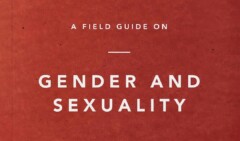Jesus said, “I have come that they may have life, and have it to the full” (John 10:10). This is what we all want, isn’t it? We all want a fulfilled and fulfilling life. But what does this life look like? How and where can I find it? What will it cost me? That’s the rub, isn’t it?
The world around me teaches that this kind of life comes by identifying what and who I am and then pursuing it all the way. There is no room here for self-denial. There is no room here for setting aside desires for the good of others. No, liberty and fulfillment come when I full-out pursue my desires, even at the expense of others. We see this when the Premier (think Governor) of my own province is lauded as brave and even heroic for walking away from her marriage in order to pursue a relationship with another woman. We see this when a man is lauded for his willingness to abandon his family in order to pursue his new identity as a woman. Freedom and bravery are expressed in what for all the world looks like selfishness.
But what about the Christian? This is where Ed Shaw’s excellent new book comes in. This is a book with two titles. When I bought it, it was titled The Plausibility Problem: The Church and Same-Sex Attraction. When I see it on Amazon today it is listed as Same-Sex Attraction and the Church: The Surprising Plausibility of the Celibate Life. If I understand correctly, the first of those titles is aimed at a European audience and the second at a North American audience, and between them they give a good sense of what it is all about.
Ed Shaw is a pastor in the United Kingdom and one who has always experienced same-sex attraction. He does not want to and has tried not to, but, at the end of the day, only feels romantic and sexual attraction for men. Yet he understands that the Bible forbids him from acting on this. While friends, family, and the world around him tell him to go ahead and to indulge, he remains fully committed to what the Bible says about sex and marriage being between only a husband and a wife. He understands that the “full life” Jesus offers must be for him, too, even if it is a life of self-denial in such a foundational way.
He believes that we, as Christians, have a plausibility problem when it comes to people who experience same-sex attraction. We do not offer a plausible alternative to the message society gives us about homosexuality. The cries from outside the church are strong and powerful and promise liberation. They tell us that fulfillment can come only by acceptance and indulgence. Many who profess Christ are now saying the very same thing. The church, on the other hand—the church committed to the authority of God’s Word, that is—offers answers that seem far less compelling. But that is simply because we have not fully understood and embraced what Christ offers to those who struggle in this way.
The heart of Shaw’s book is a series of 9 missteps Christians and their churches take when considering the issue of homosexuality and in actually accepting and ministering to Christians who are same-sex attracted. Here they are:
- Your identity is your sexuality.
- A family is mom, dad, and 2.4 children.
- If you’re born gay, it can’t be wrong to be gay.
- If it makes you happy, it must be right.
- Sex is where true intimacy is found.
- Men and women are equal and interchangeable.
- Godliness is heterosexuality.
- Celibacy is bad for you.
- Suffering is to be avoided.
As you see, some of these are related specifically to homosexuality, while others are far more general and applicable to all of us. Let me trace the second misstep as an example of the latter. The second misstep Shaw identifies is the emphasis we place on the utter centrality of the nuclear family. Of course, it is good to emphasize family and to call upon parents to build strong families, yet, as Shaw says, “One of the most radical changes between the two Testaments seems to be that the biological family matters much less than it used to. In the Old Testament, having a wife and children was seen as a sign of God’s blessing (see Psalm 128). In the New Testament, it’s noticeable that the stress is now on growing the church rather than your own biological family; its two dominant figures – Jesus and Paul – were both single.”
With our emphasis on family, we may inadvertently downplay the new kind of family relationship God wishes for us to understand and pursue. “The impression that we unintentionally give is that the church is made up of biological families, and that unless you are part of one of these conveniently shaped building blocks, you won’t ever fit in.” We need to ensure we have equal emphasis on this new kind of family God is building—a family of Christians who may not share any biological connection. This, then, provides family to those who may never have their own. “When church feels like a family, I can cope with not ever having my own partner and children. When it hasn’t worked is when I have struggled most. The same-sex attracted Christians I’ve met who are suffering most are those in churches that haven’t grasped this at all and that don’t even notice these individuals.” There is, of course, an application:
So, do you want to help make biblical teaching on homosexuality seem reasonable? Do you want to help tackle the plausibility problem? Then start acting out the Christian reality that family = church, whatever life circumstance God has put you in. Recognize the misstep that family = Mum, Dad and 2.4 children is. It will help others (and you), more than you know.
The fact is, the problem of same-sex attraction is not one that needs to be solved only by those who experience it. No, it is a problem for all of us to address as church communities.
Shaw’s book is just the latest in a number of excellent titles pushing Christians to better understand and serve those who experience same-sex attraction. It helpfully identifies specific concerns and shows how the Bible calls us to meet them in God’s way. It does all of this with a firm grounding in Scripture and without an ounce of compromise. I highly recommend it.
(It looks like at this time you can buy in print and for Kindle as The Plausibility Problem.)










